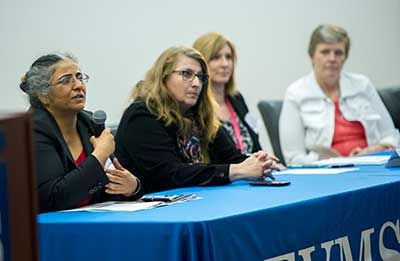
The Brock Institute aims to cultivate Mental Health and Addiction Services in Hampton Roads through collective impacts in Clinical Care, Education, and Research.
- Recent regional hospital community health needs assessments all listed mental health services as top health services that needed strengthening.
- According to the Surgeon General’s Report on Alcohol, Drugs, and Health, since 2010 the rate of opioid-connected deaths in Virginia has increased five-fold.
- In the United States; nearly 9 million people have both a mental illness and substance abuse problem.
- According to the Journal of the American Medical Association, 50% of the people who have a severe mental condition also have a substance abuse problem.
- The Center for Disease Control and the Substance Abuse and Mental Health Services Administration (SAMSHA) have demonstrated success in regional approaches to Mental Health and Addiction.
Through strategic prioritization and partnership, the Brock Institute collaboratively leads stakeholders within EVMS and throughout the region to achieve goals that measurably improve the health of Hampton Roads.
COVID-19: Mental Health Resources for Caregivers
With an added focus on physical health during this time, mental health can sometimes be an afterthought. Special thanks to our partners at the Hampton VA Medical Center, Virginia Department of Behavioral and Developmental Services, and the Veterans Administration Central Office for sharing these important resources that may be helpful to you, your colleagues, friends, neighbors and families.
National Center for Post-traumatic Stress Disorder (U.S. Dept. of Veterans Affairs):
- Managing Stress Associated with the COVID-19 Virus Outbreak
- For Providers and Community Leaders: Helping People Manage Stress
- Managing Healthcare Workers’ Stress Associated with the COVID-19 Virus Outbreak
Substance Abuse and Mental Health Services Administration (SAMHSA):
- Taking Care of Your Behavioral Health – Tips for Social Distancing, Quarantine, and Isolation
- Coping with Stress During Infectious Disease Outbreaks
For regional resources related to Childcare and Caregiving, please visit Minus 9 to 5.
For more information on the EVMS response to COVID-19, please visit here.
Joint Mental Health Summits
The Brock Institute, EVMS Psychiatry and Behavioral Sciences and additional partners jointly sponsor the yearly Joint Mental Health Summit. First established in 2014, the need for an annual summit grew out of frustrations with inefficiencies in the delivery of effective psychiatric services to acutely exacerbated patients with major psychiatric disorders and the desire to discover and correct the reasons for these inefficiencies. The Joint Mental Health Summits continue to engage stakeholders, lead discussion regarding gaps, develop strategies in collaboration with community partners to improve efficiency and effectiveness of services, and implement qualitative and quantitative measures to track improvements.
Past Mental Health Summits
May 2019
To increase awareness of the challenges and considerations that can arise as a result of military life, the 2019 summit focused on "Addressing Child and Family Mental Health Needs, Including Military and Veteran Populations." Our keynote speaker, W. Aaron Adams, MD focused on identifying Adverse Childhood Experiences and the factors that contribute to them. Partnering with EVMS Psychiatry and Behavioral Sciences, the Hampton Veterans Affairs Medical Center, and the Children's Hospital of The King's Daughters provided an excellent opportunity to highlight the resources and programs that are available here in Hampton Roads. Explore the agenda and presentations below:
- How to ACE Trauma-Informed Care: Putting Trauam-Informed Care Into Practice
- Screening, Brief Intervention and Referral to Treatment (SBIRT) Training Preview
- Case Study and Panel Discussion: Local Evidence-Based Mental Health Treatment Modalities for Children and Families
- Community Resources Mapping
May 2018
Nearly 30% of all Virginia veterans call our region home. With each veteran presenting with their own unique set of circumstances, needs and access to resources, practitioners often face a distinct set of challenges in coordinating care amongst different organizations and services. In response to these challenges, the Brock Institute partnered with EVMS Psychiatry and Behavioral Sciences and the Hampton Veterans Affairs Medical Center to host a Joint Mental Health Summit. The summit focused on addressing addiction and mental health care for Hampton Roads veterans. Explore the presentations:
- Update in addiction medicine: The important role of primary care in longitudinal assessment and treatment
- Improving population mental health impact: The role of primary care integration
- Panel Presentation
- Military Cultural Competency Training
May 2017
The Mental Health Summit was moved to May in recognition of Mental Health Awareness Month. The summit focused on addressing the opioid crisis in our community. See who attended and explore working group presentations:
- Addressing Mental Health and Substance Use Disorder in Veterans
- Virginia's Opioid Addiction Crisis: A Public Health Emergency
- Office-based opioid treatment providers for Medicaid's ARTS program
- Tidewater/Hampton Roads Behavioral Health Learning Collaborative for Existing Addiction, Recovery & Treatment Services (ARTS) Program Providers
January 2016
During this summit, working groups were established to continue the efforts discussed throughout the summit.
August 2014
The Brock Institute collaborated with EVMS Psychiatry and Behavioral Sciences to sponsor the inaugural Mental Health Summit in the Hampton Roads region. Explore the agenda and participant information.
Working Groups
The Brock Institute sponsors two Working Groups, a collaborative approach comprised of key stakeholders to address Mental Health and Addiction in Hampton Roads. The Working Groups have served to clarify issues and begin the process of developing tangible and pragmatic solutions.
Single Access Point & Community Resources
Foster and develop connections between community partners to support our local Mental Health systems and their endeavors to provide a simplified process for those seeking treatment services in Hampton Roads. Compile an extensive and thorough list of mental health and substance abuse services and initiatives available throughout Hampton Roads to serve as a resource guide for those seeking information about treatment.
Goals
- Develop a directory of service organizations throughout Hampton Roads for dissemination.
- Increase communication between providers to ensure a straightforward transition between organizations with the purpose to connect individuals with available and appropriate treatment options.
- Provide local and regional summits for mental health service providers for a) enhancement of service and support networking; b) expansion of services and supportive programs; and c) assess referral processes to ensure that individuals are being correctly matched to the appropriate levels of services and support based on need.
Outcomes
- Develop a comprehensive Mental Health Community Resource Guide for Greater Hampton Roads available via hard copy and online that is maintained and curated by the Working Group.
- Improve continuity of Mental Health Services by establishing a Mental Health community network of care through regional collaborations.
- Increase regional rates of identified individuals receiving Mental Health services through collaboration with hospital systems, outreach services, and community partners.
Guidelines for Mental Health
Develop and enhance mental health services in Hampton Roads through best practices guidelines and education in the community on mental health, substance abuse and access to treatment. In collaboration with community partners, dated perceptions and ideals surrounding individuals living with mental illness and substance abuse will be challenged and prioritized.
Goals
- Utilize national and community-based data to support recommendations and findings surrounding best practices on improving mental health education, providing timely and appropriate mental health services and reducing stigma.
- Prioritize community needs and readiness responses through targeted surveys, community forums, and educational events.
- Provide mental health information to the public and identify ways to utilize technology to improve the effectiveness of message promotion and acceptance of mental wellness as a significant component to overall health.
Outcomes
- Draft White Paper to establish guidelines on mental health best practices to engage health systems and community partners in Hampton Roads.
- Yearly prioritization of Mental Health community needs via surveys, forums, and events, published and distributed via the Mental Health community network.
- Through a network of community collaborations establish yearly updates of best practices on Mental Health to build capacity in the Hampton Roads region.
Substance Abuse and Mental Health Services Administration (SAMHSA) Education Training:
- Clinical Guidance for Treating Pregnant and Parenting Women with Opioid Use Disorder and Their Infants
- Understanding SBIRT: Foundations, Implementation, and Clinical Practice
References
- Sentara Hospital Emergency Department Data from 2016 to 2018 including patients coded or billed with opioid-related disorders obtained via EVMS Sentara Healthcare Analytics and Discovery Science Institute.
- Centers for Disease Control and Preventions. Opioid Overdoses Treated in Emergency Departments. Retrieved from cdc.gov/vitalsigns/opioid-overdoses/
- Evidence-Based Practices Resource Center, Substance Abuse and Mental Health Services Administration (SAMHSA). Retrieved from https://www.samhsa.gov/ebp-resource -center
- Houry D, et al. Opportunities for Prevention and Intervention of Opioid Overdose in the Emergency Department. Annals of Emergency Medicine, Volume 71, Issue 6, 688-690.
- Gore L. ACEP Applauds Passage of Opioid Crisis Response Act. Retrieved from http://newsroom.acep.org/ACEP-Applauds-Passage-of-Opioid-Crisis-Response-Act. 20191003
Mentally Healthy Norfolk
Mentally Healthy Norfolk is a coalition of leaders representing public health, nonprofit, government, education, and faith communities in the city of Norfolk. Working together in hope, dialogue, and action, this group is striving to address these concerns by reducing stigma, encouraging conversation, and pointing people to help.
